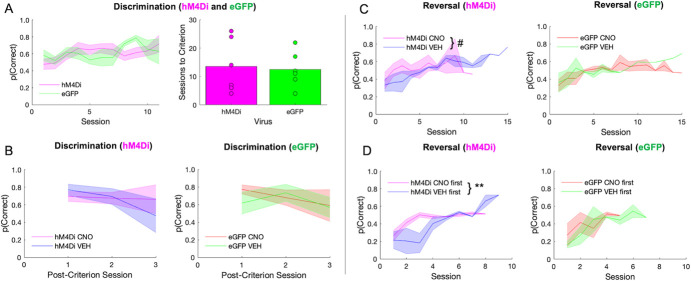Figure 2.
ACC inhibition has no effect on discrimination performance, but promotes random responding during early reversal learning. There were no differences between hM4Di and eGFP virus groups in the initial discrimination phase, however, clozapine-N-oxide (CNO) affected long-term reversal learning differently depending on virus group, and depending on when CNO was administered. (A) Performance in hM4Di rats and eGFP rats during initial discrimination of stimuli during which there was no recording and no drug administered (left). Rats did not differ by virus group in the number of sessions to reach criterion (right). (B) There was no difference between virus groups or by drug in post-criterion discrimination performance. (C) Learning curves during the reversal phase split by hM4Di (left) and eGFP (right). Irrespective of virus condition, rats rarely surpassed 60% accuracy. (D) Rats received either VEH or CNO first during the reversal phase prior to reaching 50% correct. Same learning as in C, but learning curves now split by whether rats received CNO first or VEH first. ACC inhibition during early reversal learning promotes a random response strategy that they do not recover from. Means ± standard error of the mean (S.E.M.) shades. Post-hoc Bonferroni comparisons, #P = 0.07, **P = 0.001. hM4Di n = 8 (4 female), and eGFP n = 7 (3 female).

